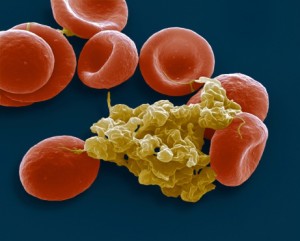Patients who are refractory to platelet transfusion are a challenge for transfusion services. Platelet refractoriness has historically been attributed to antibodies to platelet MHC, ABO blood group antigen and human platelet antigen 1. However, other potential causes of platelet refractoriness may exist.
In a recent study published in Blood, researchers compared platelet refractoriness in healthy mice to mice with a B-cell deficiency that inhibited antibody production, and they found that both types of mice were able to similarly clear mismatched transfused platelets. Immune-mediated clearance of platelets occurred in the absence of anti-MHC antibodies. Results of the study revealed that CD8+ T cells were important in platelet clearance. Additional studies of this newly recognized mechanism of platelet clearance may lead to novel methods to assist patients who are refractory to platelet transfusion.
References

